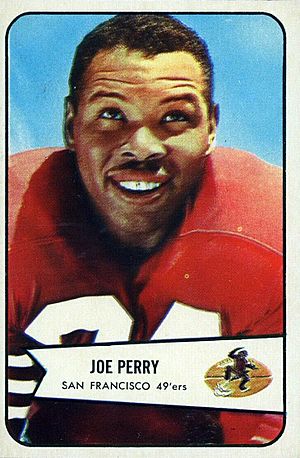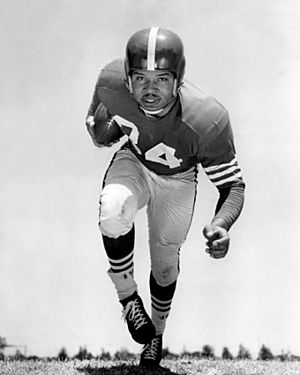Joe Perry (American football) facts for kids

Perry c. 1954
|
|||||||||||||||||||||
| No. 74, 34 | |||||||||||||||||||||
|---|---|---|---|---|---|---|---|---|---|---|---|---|---|---|---|---|---|---|---|---|---|
| Position: | Fullback | ||||||||||||||||||||
| Personal information | |||||||||||||||||||||
| Born: | January 22, 1927 Stephens, Arkansas |
||||||||||||||||||||
| Died: | April 25, 2011 (aged 84) Chandler, Arizona |
||||||||||||||||||||
| Height: | 6 ft 0 in (1.83 m) | ||||||||||||||||||||
| Weight: | 200 lb (91 kg) | ||||||||||||||||||||
| Career information | |||||||||||||||||||||
| High school: | Jordan (Los Angeles, California) | ||||||||||||||||||||
| College: | Compton JC | ||||||||||||||||||||
| Undrafted: | 1948 | ||||||||||||||||||||
| Career history | |||||||||||||||||||||
|
|||||||||||||||||||||
| Career highlights and awards | |||||||||||||||||||||
|
|||||||||||||||||||||
| Career NFL statistics | |||||||||||||||||||||
|
|||||||||||||||||||||
| Player stats at PFR | |||||||||||||||||||||
|
Pro Football Hall of Fame
|
|||||||||||||||||||||
Fletcher Joseph Perry (born January 22, 1927 – died April 25, 2011) was an American professional football player. He was a fullback in the All-America Football Conference (AAFC) and National Football League (NFL). Joe Perry played for the San Francisco 49ers from 1948 to 1960. He also played for the Baltimore Colts from 1961 to 1962. He returned to the 49ers in 1963 for his last year in football.
Joe Perry was very fast, which was unusual for a fullback. This speed earned him the nickname, "the Jet". He was the first African-American player to be named the NFL Most Valuable Player. He became one of American football's first black stars. After playing college football, Perry joined the U.S. Navy. The 49ers saw him play in the military and signed him. He spent 13 seasons with San Francisco. He was part of the famous "Million Dollar Backfield". He also played in three Pro Bowl games. In 1954, he was named the NFL MVP by United Press International (UPI).
Perry was the first NFL player to run for over 1,000 yards in two years in a row. He did this in 1953 and 1954. When he retired in 1963, he was the league's all-time leader in rushing yards. In 1969, he was added to the Pro Football Hall of Fame. The 49ers retired his jersey number 34 in 1971.
Contents
Early Life and Football Beginnings
Fletcher Joseph Perry was born in Stephens, Arkansas. His family moved to Los Angeles, California during the Great Depression. He was a talented athlete at David Starr Jordan High School. He played four different sports there. Perry looked up to African-American athletes at the University of California at Los Angeles (UCLA). One of his heroes was Jackie Robinson, who played football, baseball, and ran track.
After UCLA did not accept him, Perry played football at Compton Junior College in 1944. He scored 22 touchdowns that season. UCLA then wanted to recruit him, but he chose to join the Navy during World War II. He played football for Naval Air Station Alameda while in the military. In January 1948, Perry played in an East vs. West college all-star game. He scored a touchdown for the West team.
Professional Football Career
Joe Perry was 6 ft 0 in (1.83 m) tall and weighed 200 lb (91 kg). This was small for a fullback, even back then. Unlike many fullbacks, Perry was not just about power. He was a straight-ahead runner who used both power and speed. He was also very good at dodging defenders. His main job was to carry the ball, not to block. He was great at finding openings in the other team's defensive lines. Perry once said, "If you saw a hole, you take it. If you didn't, you kept moving until you did. You run with instinct."
His speed was legendary, earning him the nickname "The Jet." In 1947, he ran the 100-yard dash in 9.5 seconds. This was very close to the world record at the time.
Joining the San Francisco 49ers
While playing for the Navy, the NFL's Los Angeles Rams offered Perry a high salary. But he chose to sign with the San Francisco 49ers of the AAFC instead. He trusted the 49ers owner, Tony Morabito, whom he saw as a father figure. Perry was the first African-American player for the 49ers. He got his nickname "The Jet" during his first practices. Quarterback Frankie Albert said, "You're like a jet, Joe," because Perry was so fast. Another quarterback, Y. A. Tittle, agreed. He said, "He was the fastest player off the ball in the history of the world." Tittle and Perry became very close friends.
When Perry started playing, black players were new to professional football. He faced unfair treatment and mean comments because of his race. He remembered hearing racial slurs every season. But his 49ers teammates supported him strongly from the beginning. In 1949, he was invited to an AAFC All-Star game. Black players were not allowed to stay in the same hotel as white players. There was even a question if they would be allowed to play at all.
Early Success and Pro Bowl Appearances
With the 49ers in the AAFC, Perry led the league in rushing touchdowns in 1948 and 1949. He also led the league in rushing yards in 1949. In 1948, he scored his only kick return touchdown. The AAFC later closed down, and the 49ers joined the NFL in 1950. Perry was among the top five rushers in the NFL in 1950 and 1951.
In 1952, the 49ers added halfback Hugh McElhenny to the team. Perry and McElhenny became a powerful running duo. They finished third and fourth in the league in rushing yards that season. After the season, Perry was chosen to play in his first Pro Bowl.
Making History: Back-to-Back 1,000-Yard Seasons
Joe Perry made history by becoming the first player to run for over 1,000 yards in two seasons in a row. He did this in 1953 and 1954. His 1,018 yards in 1953 and 1,049 yards in 1954 were among the highest totals in NFL history at that time. He led the league in carries, rushing yards, and yards per game in both seasons. In 1953, he also led the NFL in rushing touchdowns.
Perry, McElhenny, and Tittle formed the offensive backfield for the Pro Bowl team that year. Many sports news groups named Perry their first-team All-Pro fullback. The 49ers owner, Tony Morabito, gave Perry a bonus of five dollars for every yard he gained in 1953.
In 1954, the 49ers added halfback John Henry Johnson. This meant Perry now had a strong blocker to run behind. The group of Perry, Johnson, Tittle, and McElhenny became known as the "Million Dollar Backfield". This group broke the 49ers' team record for rushing yards in a season. Even with more players sharing carries, Perry still led the NFL in rushing yards. He gained almost 400 yards more than the next closest player, his teammate Johnson. The United Press named Perry their Pro Player of the Year. He was the first black player to receive this honor. He was also a first-team All-Pro and played in his third straight Pro Bowl.
Later Years and Retirement
In 1955, the 49ers held "Joe Perry Day" before a game. Fans honored Perry with gifts, including a new car. He said it was one of the greatest honors of his life. In that game, he ran for 116 yards, more than the entire opposing team. Perry led the 49ers in rushing for seven seasons in a row.
The closest Perry came to winning a championship was in 1957. The 49ers had a good record but lost a playoff game. In 1958, he led the 49ers in rushing for the last time. That season, he passed Steve Van Buren to become the NFL's all-time leading rusher. He was again named a first-team All-Pro. In 1960, Perry carried the ball less as another fullback took over. After that season, Perry was traded to the Baltimore Colts.
With the Colts, Perry led the team in rushing in 1961. He also caught a career-high 34 passes. Colts quarterback Johnny Unitas said, "Joe was the kind of guy you'd love to play your whole career with." He added that Perry was "amazing on the screen pass" and fought for every yard. Injuries caused him to miss games in 1962. He was traded back to San Francisco in 1963. He played a smaller role in his final nine games before retiring at age 36.
Legacy and Honors
Joe Perry played football for 16 seasons, from the 1940s to the 1960s. He was the NFL's career rushing leader from 1958 to 1963. He finished with 8,378 rushing yards. His record was later broken by Jim Brown in 1963. Perry's 7,344 rushing yards for the 49ers was a team record for almost 60 years. As of 2020, his 68 rushing touchdowns with the team is still a franchise record.
He was inducted into the Pro Football Hall of Fame in 1969. This was his first year of being eligible. His longtime teammate, tackle Leo Nomellini, was also inducted that year. The 49ers' Million Dollar Backfield is special. All four of its members are in the Hall of Fame. The 49ers retired Perry's jersey number 34 in 1971. He was also a first member of the San Francisco 49ers Hall of Fame in 2009. After he passed away in 2011, the team honored him by wearing helmet stickers with his number 34.
Later Life and Impact
Besides football, Joe Perry also hosted a popular radio show. It was called "Both Sides Of The Record" and played sports and music. After retiring from football, Perry played in the Professional Bowlers Association Tour. He had a very good average score. He also worked as a scout and assistant for the 49ers. Later, he was a sales representative for a winery.
Joe Perry passed away on April 25, 2011, in Arizona. He was 84 years old. The 49ers owner, John York, shared how much Perry meant to the team and to him personally. He said Perry had a lasting impact on football and inspired many players.
After his death, researchers studied Joe Perry's brain. They also studied the brain of his Million Dollar Backfield teammate, John Henry Johnson, who died shortly after Perry. The researchers at Boston University were studying head injuries in sports. They wanted to learn more about chronic traumatic encephalopathy (CTE). This is a brain disorder linked to repeated head impacts. Perry's wife, Donna, believed her husband had CTE. She said that when Joe played, players would be sent back into games even after head injuries. She hoped that new equipment and research would help protect players better.
See also
 | Misty Copeland |
 | Raven Wilkinson |
 | Debra Austin |
 | Aesha Ash |


